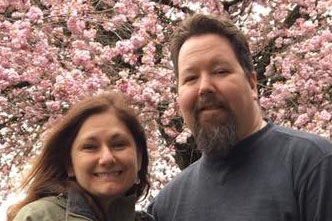“Daddy, why’s your arm shaking?”
That question came one January night in 2017.
My outstretched arm was trying to hand my eight-year-old son a glass of water.
It was shaking uncontrollably. I wouldn’t have an answer for my son for seven months when I was diagnosed.

That was a private journey for me and my family. Now it’s time to go public, and if there ever was a day to do so, it’s April 11, World Parkinson’s Day.
This is a day to bring attention to a disease that is longing for a cure and is now being described by researchers at the University of Rochester Medical Center as a worldwide pandemic.
“Pandemics are usually equated with infectious diseases like Zika, influenza, and HIV,” said University of Rochester Medical Center neurologist Ray Dorsey, in a commentary in the JAMA Neurology. “But neurological disorders are now the leading cause of disability in the world and the fastest growing is Parkinson’s disease.”
I read the report and listened to Dorsey on this Michael J. Fox Foundation podcast, in which he points out that between 1990 and 2015, the prevalence of Parkinson’s more than doubled across the globe. By 2040 it will double again — a rate of growth that will outpace Alzheimer’s. Dorsey’s ultimate plea is for the Parkinson’s community to speak up, demand action, rally, and change the trajectory of the disease.
LISTEN: “When life gives you Parkinson’s” – Larry Gifford shares his own story with PD, including what it is like to receive a life-changing diagnosis.
“For too long the Parkinson’s community has been too quiet on these issues,” said Dorsey. “Building on the AIDS community’s motto of ‘silence=death,’ the Parkinson’s community should make their voices heard. The current and future burden of this debilitating disease depends upon their action.”
With those words, I realized I have a role to play. My voice, though not as strong as it once was, is needed to raise awareness for this cause.
My diagnosis officially arrived last August after months of tests to eliminate much scarier and deadly diseases. My symptoms were a disparate collection annoyances; a shuffling, foot-dragging walk, tremors in my arm, loss of coordination and balance, and difficulties speaking, sleeping and focusing sometimes. I never linked the symptoms as one thing. I assumed I was tired or my shoes were too heavy, or I was just out of shape. By the time I was diagnosed, I probably had been battling the disease for a decade. Symptoms began appearing three or four years ago, and through those undiagnosed years, doctors tell me I lost approximately eight per cent of my brain cells.
- Naloxone-resistant street drug linked to 9 deaths in Eastern Canada seized in Alberta
- Buzz kill? Gen Z less interested in coffee than older Canadians, survey shows
- ‘She gets to be 10’: Ontario child’s heart donated to girl the same age
- Canada updating sperm donor screening criteria for men who have sex with men
Parkinson’s is a relentless, degenerative disorder of the central nervous system. It directly impacts nerves that handle motor functions for the body as a whole. As the disease advances, the body slows down, arms and legs stiffen and shake and a whole slew of fun surprises arise.
For me, each day is different. I take pills four to five times each day which control my tremors. My whole right side is slower than my left. The delay causes a shuffle, drag or clomp in my walk and I can’t really run anymore without increasing my chances of a face plant (not that I ran much to begin with).
I’m right-handed, so I’ve had to learn how to share some tasks with my left hand. I can type, but my left hand covers three-fourths of the keyboard. I now am a left-handed frisbee thrower. If needed, I can eat and shave left handed.
Due to reaction delays and self-confidence, I drive infrequently and now usually use public transit or cabs.
The disease has stolen much of my sense of smell and therefore taste. My facial expressions are more subtle. I’m sure I’m moodier. In general, I feel slower and smaller — which, for a six-foot-tall, 275-pound guy, needs some explanation. As this disease progresses, movements in fingers, hands, arms, legs, and feet get smaller and smaller. That’s why so many Parkinson’s patients are now doing boxing, tai chi and other large movement exercises.
Exercising is the one thing all Parkinson’s patients can do to slow the progression of the disease and symptoms. Exercise and I have had an adversarial relationship my whole life, so we are reacquainting. There’s quite convincing evidence we should be friends again. I’m working on it.
I know it all sounds scary. And it is. For more than 10 million people and their friends and families, it’s scary.
Many have it far worse than me. I’m considerably young, 46, to be diagnosed. I still work over 40 hours a week. I still get around. My symptoms, while numerous, aren’t severe. I can still find joy in life, laugh at symptoms du jour, cook with my wife, play with my eight-year-old son, and create new family memories each day that I hope aren’t stolen from me by this disease.

Parkinson’s is not a deadly disease. And because the threat of death isn’t imminent, Parkinson’s doesn’t get the attention other diseases get when it comes to fundraising and awareness. It is also not lost on me that we, the Parkinson’s patients, who should speak up and advocate for ourselves, often have thin, shaky, fading voices as the disease slowly silences us. I’m speaking now before it is no longer my choice.
WATCH BELOW: Tears could help diagnose Parkinson’s disease

Please, we need your help.
Raising money for research and development for new treatments and hopefully for one day finding a cure is why I’ve decided to share my story. As things stand, chances are high that someone reading this, maybe you, will also be diagnosed with Parkinson’s.
On this World Parkinson’s Day, I encourage you to donate whatever you can to organizations that are actively investing in Parkinson’s research. Help us find a cure.
Some great organizations are listed below.
Parkinson Society of British Columbia
American Parkinson Disease Association
Larry Gifford is the senior program director of 980 CKNW and AM 730 Traffic, and manager of talk and talent for Corus Vancouver.




Comments